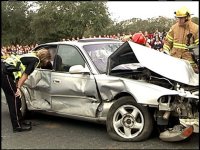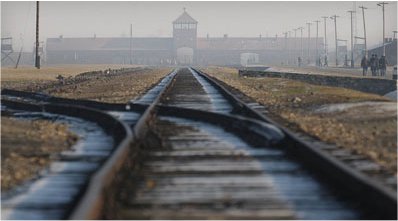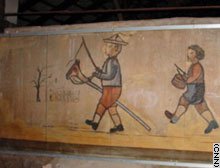 You can’t tell 16-year-old kids how dangerous driving a car is and have them really hear you. It doesn’t mean you shouldn’t try, and they might even understand it superficially. But I’m convinced they don’t yet have the wiring to feel it in their souls at that age. I don’t think anybody gets it at 16, and a hundred thousand bloody, mangled cars parked on a hundred thousand high school lawns the week before a hundred thousand senior proms won’t change it.
You can’t tell 16-year-old kids how dangerous driving a car is and have them really hear you. It doesn’t mean you shouldn’t try, and they might even understand it superficially. But I’m convinced they don’t yet have the wiring to feel it in their souls at that age. I don’t think anybody gets it at 16, and a hundred thousand bloody, mangled cars parked on a hundred thousand high school lawns the week before a hundred thousand senior proms won’t change it.
Then one day in traffic, maybe as late as 25 or 26 years old, it clicks. You finally get your visceral self all the way around what you’re doing, and how close to serious injury or death you are anytime you’re on the road. You understand that driving is, by far, the most dangerous routine activity you undertake. And suddenly it’s not quite so important for you to beat that guy to the gap, and you decide that waiting for the 3:35 freight train to pass won’t be a tragedy after all.
Or perhaps you think, as I did on my commute one night about nine years ago: “Hey Bo, if you just relax a bit, you’ll get home about two minutes later than if you continue to drive aggressively–but your chances of bending your car and/or breaking your body will go down considerably.”
Click. I got smarter.
I’ve noticed the click before in my adult life. It feels deceptively immediate, though I suspect my brain is working subconsciously on whatever the problem is well before I realize it. The click is merely the culmination. “Suddenly,” I know something. Before I might have known bits and pieces of it, but the larger truth comes remarkably instantly.
The most significant click for me recently was with the base reality of the Holocaust. I was reminded of it today by this Time story on “dark tourism.” My original click on it happened with the 60th anniversary of the liberation of the Auschwitz-Birkenau death camp, about two and a half years ago.
 I’ve known intellectually what the Nazis did since high school, of course. In fact, I’ve known pieces of it since the fourth grade. I can remember seeing a filmstrip at eight years old that included footage of mass graves at Nazi death camps. I remember Mrs. Dillard warning us about it before she showed it.
I’ve known intellectually what the Nazis did since high school, of course. In fact, I’ve known pieces of it since the fourth grade. I can remember seeing a filmstrip at eight years old that included footage of mass graves at Nazi death camps. I remember Mrs. Dillard warning us about it before she showed it.
But something in that 60th anniversary remembrance, and in particular this site that I explored when I was reading about it, spoke to me in a new way. Perhaps it was the first time I’d carefully considered it as a father. Children have a way of generating new perspectives.
 I’ve thought of the pictures the inmates drew on the walls, depicting the innocent lives from which they were so ruthlessly and senselessly ripped. I’ve tried to imagine working 18 hours’ hard physical labor, then trying to get to sleep hungry and thirsty. I’ve strained to hear the desperate cries of a mother in the barracks whose children were taken from her as she got off the train. I’ve thought of another mother trying to comfort her, when she knows in her heart there isn’t a thing she can say that will make it better.
I’ve thought of the pictures the inmates drew on the walls, depicting the innocent lives from which they were so ruthlessly and senselessly ripped. I’ve tried to imagine working 18 hours’ hard physical labor, then trying to get to sleep hungry and thirsty. I’ve strained to hear the desperate cries of a mother in the barracks whose children were taken from her as she got off the train. I’ve thought of another mother trying to comfort her, when she knows in her heart there isn’t a thing she can say that will make it better.
I’ve thought of the frantic screams and claws at the door and walls when it hits home that no, this isn’t a shower or a delousing.
I’ve considered the horrors of learned men–the leaders of a nation proudly including what was unambiguously a highly successful industrial complex–calmly and soberly planning and attempting to execute the extermination of an entire race. Memos, telephone calls, meetings, consultants–just as if they were planning civic improvements. In their twisted minds, of course, I suppose they were.
I’ve thought “hey, this was only a little more than 60 years ago.” It’s incredible how much shorter that time seems to me now than it did when I was, say, in college. And it blows my mind that when I sat in a classroom on Leighton Avenue in Anniston at eight years old and saw that mass grave on an educational filmstrip, it was only 35 years ago then.
Click.
In too many places in the world today, there is evil and hatred of this strength, if not this scope (yet). As concerned as I am about radical Islamic fundamentalists successfully killing thousands of my countrymen again, part of me is even more concerned about a second Holocaust. Perhaps they are different sides of the same problem.
It’s easy to denounce “nation building” from the comfort of an ergonomic office chair and a keyboard. I find the deaths of our young men and women as repugnant as anyone, particularly when American interests are not obvious. But how many were already dead in Nazi Germany before we realized the gravity of the problem? How many in Stalin’s USSR? How many in Pol Pot’s Cambodia?
How far up this horror curve was Iraq five years ago? How far up the curve (now) is Iran? North Korea? Syria? Cuba? Zimbabwe? What’s Venezuela going to be like in ten years?
What is the moral obligation of the most prosperous and powerful nation in human history to the systematically and brutally oppressed?
I really don’t know the exact answer, but I believe it isn’t “none.”
Long live the click. May I never be deaf to it.
Thanks to csisd.org for the car image. Thanks to cbc.ca for the Auschwitz-Birkenau main gate image. Thanks to cnn.com for the barracks drawing image.
You might also like:
- Going back
I spent today in Oxford and Anniston, where I lived until I was 15 years old. The high school class … - Hey, Bob Jones Class of ’88!
It’s that time. Yes, we flipped that tassel from the left to the right almost 20 years ago. I know i… - Restitution for a 1987 dine-and-dash
I was 16 years old the only time I ever dined and dashed. It was at Terry’s Pizza on Governor’s Driv… - Band kid
Nathan is about to be a band kid. Next year he’ll begin playing trumpet in what was known as “A BAND… - MySpace strikes again
This time I heard from Rusty, a classmate I haven’t seen since our ten-year reunion. In high school …
I agree with you…I’ve had “the click” many many times. I’ve had it while driving, while working, while standing on a ladder….all kinds of places. Life can change in an instant. I’ve had the exact same thoughts about how I’d feel if my children were being abused and I was helpless to do anything. The thing is, that kind of stuff is happening right now all over the world. Think about the civilians in Iraq that are caught in the crossfire going on there. We may never know the number of civilian casualties that have occurred in the course of our conflict there.
I can’t, however, agree with the concept of “nation building” as it’s been foisted upon the world by our current government. WE have become the ones doing the very things we were told we were going to Iraq to stop…we have tortured, kidnapped, made people ‘disappear.’ These were some of the very reasons we wanted to get rid of the previous regime. They were bad people doing bad things…look at how they were treating their own countrymen. Who’s doing that over there now? Could it be us?
It’s interesting that you mentioned Germany and Hitler, Russia and Stalin. Hitler had the “Fatherland.” Stalin had the “Motherland.” Bush has “The Homeland.” I find all kinds of irony in the way this whole thing has gotten out of control.
I support the troops. I have friends there and I want them to be safe and accomplish the task set before them. But I can’t condone the way that America’s “Democracy building” is shaping up. If you look at it closely, the people in charge aren’t trying to make the world safe for democracy, they’re trying to make it safe for Exxon, McDonalds, GM, Phizer Pharmeceutical, Dupont, GE and all the other big companies that run America. It’s not democracy we’re pushing…it’s capitalism and commercialism. We want to make the world safe to make a buck in. The bottom line is it’s the bottom line that we’re there for.
That should click.
Whatever you thought at the time or think now of Iraq (and my personal feelings for each time period are quite different), it’s inarguable that we are well short of unqualified success almost five years in. Unfortunately I have little hope of anyone in Washington ever elevating this grave issue beyond the level of “political football.” Democrats and Republicans alike have demonstrated that their primary desires are to control the news cycle for a week with a zinger or two, and then get to work on figuring out how to do it next week too. We’re not likely to forge anything constructive as long as that continues.
The thing is, I don’t agree with the concept of “nation building” as a matter of policy either. But, neither do I think it’s a good thing to swing it entirely the other way. When I call myself a “Libertarian with asterisks,” that’s one of the asterisks. Libertarians, by and large, want trade agreements and to defend when the U.S. is attacked, and that’s it. I disagree.
But is it black-and-white, or gray? Even staunch opponents of U.S. interventionism would, I think, agree that at some point, the U.S. should act to stop genocide and other systematic mass murder. Where is that point? I don’t know. I’d love the comfort of a formulaic answer, but I don’t think it exists. The answers that are easy to give are at either extreme, and I find them each inadequate. Choosing between shutting the U.S. off from the outside world and sending hundreds of thousands of troops on nation-building missions that may take decades is a false choice.
Was Clinton right to act in Bosnia-Herzegovina? If so, how many less people would have had to die before it was the wrong thing to do? Was he wrong to avoid the Rwandan genocide? If so, how many more people would have had to die before it was the right thing to do?
Does the most prosperous nation in the world have any moral obligation to innocent people who can’t help themselves?
The map is not the territory. L’état ce n’est pas moi.
Greg, please say some more. I’m not following.